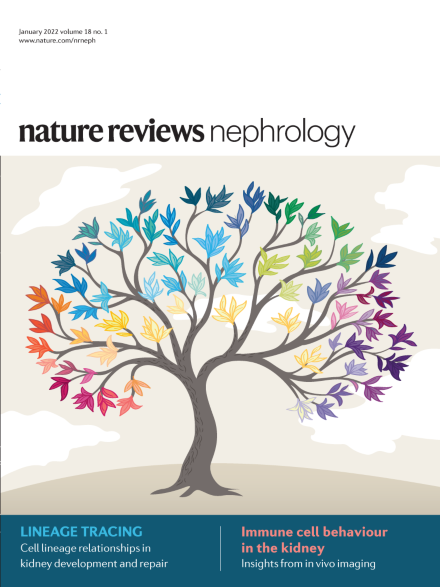Contribution of APOL1 variants to CKD risk in West Africans
IF 28.6
1区 医学
Q1 UROLOGY & NEPHROLOGY
引用次数: 0
APOL1变体对西非人患慢性肾脏病风险的影响
G1和G2 APOL1风险等位基因是美国黑人罹患慢性肾脏病(CKD)的重要风险因素;然而,生活在西非(大多数美国黑人的祖籍地)的人罹患慢性肾脏病的遗传风险与APOL1变体有关,但尚未得到深入研究。H3Africa 肾脏病研究网络在 ASN 肾脏周 2024 上发表的最新研究结果表明,APOL1 风险变体也是生活在加纳和尼日利亚的人患上 CKD 及其进展的重要风险因素。所有参与者中有 43% 携带一个 APOL1 风险等位基因,29.7% 携带两个。与只有一个风险等位基因或没有风险等位基因的人相比,携带两个 APOL1 风险等位基因的人患慢性肾脏病的几率高出 25%(调整后 OR 为 1.25;95% CI 为 1.11-1.40),患局灶节段性肾小球硬化症(FSGS;调整后 OR 为 1.84;95% CI 为 1.30-2.61)的几率高出 84%。然而,在具有一个 APOL1 风险等位基因的个体中,这些风险也会增加(患 CKD 的几率增加 18%;调整 OR 为 1.18;95% CI 为 1.04-1.33;患 FSGS 的几率增加 61%;调整 OR 为 1.61;95% CI 为 1.04-2.48)。在具有 APOL1 风险等位基因的个体中,CKD 的调整后几率也随 CKD 分期的增加而增加,这表明 APOL1 风险变异也是疾病进展的一个风险因素。
本文章由计算机程序翻译,如有差异,请以英文原文为准。
求助全文
约1分钟内获得全文
求助全文
来源期刊

Nature Reviews Nephrology
医学-泌尿学与肾脏学
CiteScore
39.00
自引率
1.20%
发文量
127
审稿时长
6-12 weeks
期刊介绍:
Nature Reviews Nephrology aims to be the premier source of reviews and commentaries for the scientific communities it serves.
It strives to publish authoritative, accessible articles.
Articles are enhanced with clearly understandable figures, tables, and other display items.
Nature Reviews Nephrology publishes Research Highlights, News & Views, Comments, Reviews, Perspectives, and Consensus Statements.
The content is relevant to nephrologists and basic science researchers.
The broad scope of the journal ensures that the work reaches the widest possible audience.
 求助内容:
求助内容: 应助结果提醒方式:
应助结果提醒方式:


